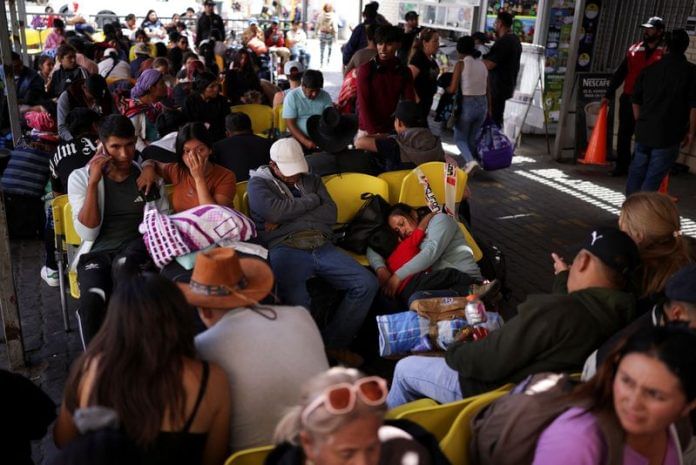By Alexander Villegas
COLCHANE, Chile (Reuters) -Chileans are heading into Sunday’s presidential election consumed by fear over crime, immigration and organized gangs that have taken root in a few short years, a far cry from the wave of left-wing optimism and hopes of drafting a new constitution that dominated the last election cycle.
Polls show crime now eclipses the economy, health or education as Chileans’ top concern. Sixty-three percent said it was their biggest worry in October’s Ipsos What Worries the World survey, placing Chile second among 30 countries including Mexico, Colombia and South Africa.
Chile remains one of the safest countries in Latin America, but the murder rate more than doubled from 2.32 per 100,000 in 2015 to 6.0 in 2024 and kidnappings reached an all-time high of 868 in 2024, with the state attorney’s office linking 40% to organized crime.
Shootouts in broad daylight, contract killings, dismemberments and extortion kidnappings, long a reality in parts of Latin America but previously very rare in Chile, have shocked the nation and even stunted economic growth as people adjust their daily habits.
The surge has come alongside a wave of migration of Venezuelans, going from 82,998 in 2017 to 669,408 in 2024 according to the latest census data. The immigration backlash has blurred into the crime debate.
A 2025 poll by Activa Research found that 85.2% of Chileans felt socially distanced from Venezuelans, up from 55.2% in 2019.
Lucia Dammert, a sociologist at the University of Santiago who specializes in organized crime in Latin America, says significant increases in migrants and crime after the pandemic created dual shocks for a country used to neither.
“We haven’t recovered from these shocks,” Dammert said. “And it’s heavily reflected in the political debate that hasn’t managed to move past the shock and is capitalizing on these problems.”
Sunday’s race pits Jeannette Jara, the governing left’s coalition candidate from the Communist Party, against an array of right-wing contenders. The race will most likely go to a run-off on December 14 with polls showing far-right Jose Antonio Kast as a favorite to win.
Kast has vowed to expel all undocumented migrants and his “Border Shield” plan includes building a 5-meter border wall with 3-meter trenches and electric fences.
EYES, WALLS AND MINES ON THE BORDER
No place has become a bigger flashpoint for migration and crime than on Chile’s northern desert borders with Peru and Bolivia.
Colchane, a tiny town on the Bolivian border and home to just a few hundred mostly indigenous Aymara and elderly citizens, was thrust into the national spotlight as hundreds of thousands of mostly Venezuelan migrants crossed into Chile through the area from 2021.
Residents were used to leaving their doors unlocked and cars on the street, but a wave of break-ins, robberies and even the murder of an 85-year-old woman in April has left many mistrustful and nervous.
Jocely Garcia, 33, always enjoyed the high-altitude, wind-swept wetlands of Colchane where her llamas freely graze on both sides of the border. Earlier this year, she said a man with a foreign accent tried to steal her brother’s car when he dropped by one morning.
“Nothing like that had ever happened to me,” Garcia said. “You can’t leave the house unless you lock it up anymore, if you have anything valuable like a car or a bike, it gets stolen.”
THE RISE OF ORGANIZED CRIME AND SPECTER OF TREN DE ARAGUA
Raul Arancibia, a former top prosecutor for northern Chile’s Tarapaca region, remembers the first time he heard of “Tren de Aragua,” a Venezuelan trans-national gang.
In late 2021, when Venezuelan migration to Chile was growing exponentially, two women were caught crossing the border with ketamine, a rare drug in Chile at the time.
The investigation pointed to Pisiga, the Bolivian town on the other side of Colchane, where Tren de Aragua dominated the border and flow of migrants.
Chile’s north, which borders two major drug producers, has a large porous border and a major, duty-free port, was relatively unknown to international criminal organizations before large-scale immigration brought it to their attention.
“And when you traffic people you say, why don’t we traffic weapons? If you already have control and knowledge of the routes, you expand your business,” Arancibia said.
He said they began seeing new types of crimes like extortion, torture and contract killings that quickly spread across the region.
“Even Chilean criminals weren’t used to that kind of violence so they had to adapt” and become more violent, Arancibia said.
He said he tried to sound the alarm bells in Santiago in 2021, but his warnings went unheeded. Then when President Gabriel Boric assumed power in 2022, murders reached their highest level and the progressive government scrambled to boost funding for police, pass new laws, create dedicated task forces to fight organized crime, and deploy the military to the border.
The Chilean government says it has arrested hundreds of Tren de Aragua members and has the gang on its back foot while the current administration and Jara say that lifting banking secrecy laws are an essential next step to tackling organized crime.
Right-wing candidates disagree and are opting for varying degrees of heavy handed approaches to fight gangs and stem migration.
For Dammert, focusing too much on the border and international organized crime groups draws attention away from how deep-rooted the problem has become.
“Sometime we look at the transnational criminal groups really closely but forget to look at our own,” Dammert said. “At the end of the day, most of the people in prison are Chilean and most of the gangs are run by Chileans.”
(Reporting by Alexander Villegas; Additional reporting by Sarah Morland and Alistair Bell)
Disclaimer: This report is auto generated from the Reuters news service. ThePrint holds no responsibility for its content.






